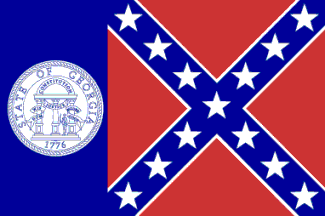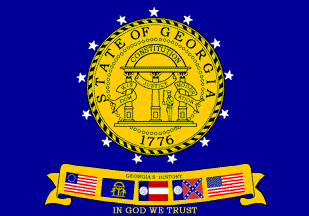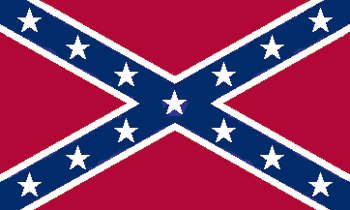But that is only part of the reason why the Civil War was fought. Southern heritage and culture should not be hidden, taken away or shunned. It is part of American History.
Source: http://www.csmonitor.com/2005/0224/p01s05-ussc.htmlBattle over the past rages on in an evolving South
By Patrik Jonsson | Correspondent of The Christian Science Monitor
RALEIGH, N.C. Bronzed Johnny Rebs, sprinting across a Capitol lawn, charging soundlessly for the ideals of the "lost cause," have long been seen as a quaint and largely harmless part of this region's heritage. Today, doubts rise alongside pride in regard to these sculpted heroes.
A school board declines to name a new high school in Cherokee County after Georgia's Civil War governor. Floridians question why Confederate soldiers adorn a water tower. Even the word "South," in some quarters, has become a slur - a convenient repository of national guilt over the exploitation of Africans in the Cotton Belt a century and a half ago.
Beyond Confederate flags coming down from statehouses, more-mundane symbols are increasingly being questioned on the local level: in town halls, college campuses, and even cemetery committees. It's part of a deepening homogenization of Southern culture that's causing anger and resentment among many in a proud region with perhaps 65 million people who consider themselves Southerners.
Some observers see a note of irony in the growing suppression of conservative Southern memorials at a time when old Confederate values like militarism, chivalry, gentility, and religiosity are gaining political prominence. It's a lesson, they say, in how a rebellious American region maintains its influence beneath pressure to rescind its mottoes and murals.
"The shooting war is over, but ... we're engaged in a cultural war for the heart and soul of the South and for America, too," says William Lathem, spokesman for the Southern Heritage PAC in Atlanta.
Indeed, beneath the ceaseless skirmishes over Southern symbols lurks a deeper debate over the potency and potential of a region shaped by Scots-Irish settlers who wanted a small, God-fearing government that stayed out of their lives.
Today's regional relations remind some historians of the War of 1812. New Englanders protested against the war, and it took Andrew Jackson to end it at New Orleans with a trouncing of the British by the Louisiana artillery. Witness the last presidential election, which revolved around the president's decision to invade Iraq and his muscular response to Islamist terrorism. The ideological "red-blue" borders almost perfectly traced the regional sentiments of the mid-19th century, with Ohio to this day in play.
"Why bother about this talk of separateness when you're arguably in a position - the South is - to dominate the Union as [Confederate unionist] Alexander Stephens envisioned it before the Civil War: the South in a political alliance with the West," says Jim Langcuster of Alabama, a moderate proponent of Southern heritage.
Still, even as Gambians and Swedes flock to cities like Raleigh and Birmingham, wizened black butlers still wait on gaggles of white golfers at certain exclusive clubs. And the disdain toward the South most often attributed (at least by Southerners) to "limousine liberals" is increasingly leading to action from the Florida interior to the hilltops of Georgia, most likely as a result of a massive in-migration of "those people," as Gen. Robert E. Lee called his foes.
Parents in Cherokee County, Ga., successfully urged their school board to refuse to name a new high school for Joseph E. Brown, the Confederate governor who, at the risk of his popularity, welcomed federal reform after the Civil War.
In Georgia, there's a tough fight brewing over bringing a bust of Confederate President Jefferson Davis from Jeff Davis County - where there are four Jeff Davis schools - to the Georgia Capitol.
And, in Charlotte, N.C., a decision was recently made to take down the battle flag - from a Confederate cemetery.
At old-line Southern colleges like the University of the South, regents are downplaying old Confederate-era rituals and even the word "South" so as not to scare away prospective students from up North.
"When people have a sense that things are unraveling, whether it's on the right or left, these questions come up again," says Ira Berlin, a Civil War historian at the University of Maryland.
But Southern heritage proponents are winning some skirmishes, too.
In Florida, the town of Brooksville decided not to change the image of Confederate soldiers on the water-tower logo after someone pointed out that an annual reenactment of the "Brooksville Raid" was a major tourist draw. In South Carolina, a bill is moving forward to allow the Sons of Confederate Veterans their own license plate. Seventy-two percent of Georgians want to see a referendum on bringing back the pre-2001 Cross of St. Andrew's flag across the Peach State. Stone Mountain with its 90-foot carved images of Lee, Davis, and Stonewall Jackson is still Georgia's biggest tourist draw. "Part of Southern culture is the recognition that there are things worth fighting for," says Jim Thompson, editorial page director of the Athens, Ga., Banner-Herald.
Southerners say the region's critics often take not only historical but biblical references and meanings out of context - the result, they say, of biased schooling.
It remains a highly charged debate, since perceptions of past are also a lens on the present. Most Southerners today agree that blacks are also original settlers and inheritors of the South, and deserve their equal place in civic affairs. But critics worry that some of the worst elements of the "old" South may be rising again - their suspicions fueled by a nationwide weakening of affirmative action and an ongoing resegregation of public schools, especially in the South.
The last time "Dixie" was whistled officially in the capital was probably during Ronald Reagan's first inauguration. But last year, Bush supporter Robert T. Hines shot a cannon at Arlington National Cemetery on Davis's birthday.
"The culture of the South is an expanding thing rather than a xenophobic and dwindling thing," says John Hurley, president of the Confederate Memorial Association in Washington.












